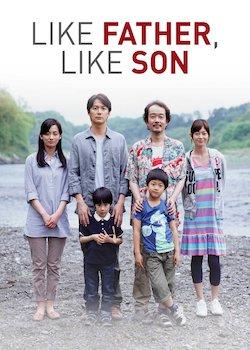Like Father Like Son

Directed by Hirokazu Koreeda
2013, 121 minutes
Currently out on release on DVD from Arrow Films
Review by Mike Sullivan
Hirokazu Koreeda is a director who has made the move from directing documentaries in the 1990s to now writing and directing films which document human lift. In the 1998 movie After Life he told the story of souls, people who have just died, who need to choose their happiest memory to serve as their heaven. They would then experience this memory forever. In 2004 Koreeda began to gain international fame with his movie Nobody Knows which was based on the true story of four children who had been abandoned and who survived for nine months by themselves. This movie won several awards at the 2004 Cannes Film Festival. In 2008 Koreeda’s film Still Walking focused on a family over 24 hours as they commemorate the death of the oldest son 15 years before.
Like Father Like Son is again in a similar vein of looking at human lives as we see how two families cope when they discover that their sons were mixed up at birth and that each set of parents had been bringing up the child of different people. It was nominated for the Palme d’Or at the 2013 Cannes Film Festival, and it won the Jury Prize. It was also shown at the 2013 Toronto International Film Festival, and the 2013 Vancouver International Film Festival. This film stars Masaharu Fukuyama, a musician, singer and actor, and Lily Franky, a popular comedian and actor, as the two fathers of this story and Machiko Ono, film and TV actress, and Yoko Maki, also a film and TV actress, as the two mothers. They are all well-known faces on Japanese TV and bring real experience and depth to their characters and to this film.
Ryota (Fukuyama) is a hardworking man who is married with one child; they are a well off family and keep their child busy with lessons and recitals. One day they are asked to come to the hospital where their son, Keita, was born and are faced with the unbelievable news that their son isn’t their son. He was switched at birth with another child. They agree to a meeting with the ‘parents’ of their real son and the contrast between both sets of parents is clear, compared to the more polished and dignified appearance of Ryota and his wife, Yudai (Franky) and his wife are rather different. As both sets of parents attend the hospital’s investigation they discover that the nurse who attended the births did not switch the babies by accident. She envied Ryota and his wife for their apparent happiness and evidence of wealth, and so she swapped their child with another.
Both families then have to figure out what to do going forward, the hospital gives them advice, but for anyone it is really hard to give away the child you have raised and accept another in his place. Both families spend time together and it becomes evident that while Ryota believes himself to be a good father he pales a little bit in comparison with Yudai whose shop is attached to his family home and who spends a lot of time with his children. Slowly the story reaches the point where they try having their real sons in their own homes, much to the confusion of these young boys.
Koreeda presents a story which is painful to watch at times, it is hard to imagine how people in real life have dealt with this kind of situation and this comes across in the movie. Fukuyama gives an amazing performance by which he presents himself as a father who begins to question his own parenting skills, while never putting us in doubt about how much he loves his son. In the end Koreeda leaves us with questions, but that is within his style.

